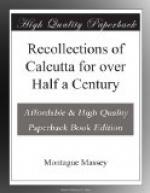Then the Corinthian Theatre was built on the site of Dover’s horse repository in Dhurrumtollah, and subsequently, on the site of the present Opera House, a smaller building was erected, in which an Italian Opera Company used to perform. When the late King Edward, then Prince of Wales, came out in 1875, the Italian Opera Company was playing there. The company’s expenses were guaranteed before they came out, all the boxes and stalls being Tented at high prices, taken for the season. During the Prince’s visit, Charles Matthews and Mrs. Matthews also came out with their company and gave several performances in the city.
EARLIER BUSINESS HOURS.
Turning from sporting and theatrical matters to the more important topic of business, one cannot help realising the difference between then and now. Business generally used to commence earlier than it does now and many of the European houses, particularly the Greek firms, opened their offices punctually at 9 o’clock, by which time both Burra Sahibs and assistants were at their desks. I have very often passed several contracts by the time offices open nowadays. The Hatkhola Jute dealers usually began the day’s Work at 6 o’clock in the morning, and most of the buying by European houses was finished by 9 o’clock. There were in those days no gunny brokers, their services not being required, as the only Jute Mill then in existence was the Borneo Company, which was afterwards converted into the Barnagore Jute Mill Company.
Another thing which will strike the present-day broker as strange is that there was no Exchange where brokers and merchants could meet together. The only place approximating to it was a room in the Bonded Warehouse, which was set apart for the purpose and called the Brokers’ Exchange. There brokers of all kinds used to meet each other, have tiffin, and write their letters and contracts. The stock and share brokers transacted their business in the open air in all weathers on a plot of land where James Finlay & Co.’s offices are now, and this was usually referred to as the “Thieves’ Bazaar.”
THE PORT CANNING SCHEME.
Speaking of business reminds me of the great excitement created by the Port Canning Scheme over 50 years ago. The rumour was spread abroad, as it has been more than once since, that the Hooghly was silting up and Calcutta as a port was doomed. The idea, which originated with a German, was to build a port with docks and jetties and all other conveniences at Canning Town which was then already connected with Calcutta by a railway. The Company was no sooner floated on the market than the wildest excitement ensued—people tumbled over each other in their mad desire to obtain shares at any price, and even high Government officials were known to have forwarded to the Promotor blank cheques for him to fill in the amount in the hope of being allotted original shares. The scrip changed




